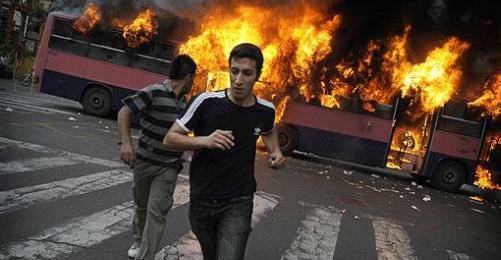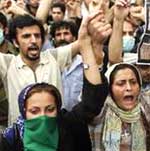Iranian Elections 2009
Ahmadinejad Accused of Stealing Poll

Iran's leading opposition candidate, Hossein Mousavi, described the presidential election as a "coup" in the night of Saturday, 13 June, and called on the international community not to recognise the official results.
According to his spokesman outside of Iran - where the candidate has not been seen in public for more than 24 hours - Mousavi was being prevented from communicating with his supporters and aides but wanted to get the message out to the world that the election had been stolen.
Mohsen Makhmalbaf, a celebrated Iranian film director based in Paris and influential Mousavi supporter, said he had been asked to speak on behalf of the candidate because of the clampdown on his organisation in Iran.
"A coup d'etat"
"I have been asked to warn the world that this is a coup d'etat, and Mousavi has asked for the world's government's not to recognise a president created by a coup," Makhmalbaf said.
Mousavi claimed he had been informed he had won the election convincingly by the interior ministry on Friday night. That claim was first published on Makhmalbaf's website, which was subsequently closed down by a cyber attack.
"This semi-democratic country has taken an important step towards dictatorship," Makhmalbaf said.
Mousavi has also challenged the decision by Iran's supreme leader, Ali Khamenei, to endorse the official results giving President Mahmoud Ahmadinejad a landslide victory in the Friday poll.
He is reported to have met Khamenei and asked him to reconsider that decision, and to have written to the guardian council, a powerful clerical body that oversees elections, saying "fraud is evident and review and nullification is requested".
Clashes in cities
Protests continued across Tehran yesterday and were still going on as night fell. Clashes between demonstrators and security forces were also reported from Mashad, Tabriz and Shiraz but disrupted communications made it hard to confirm reports of incidents.
Ahmadinejad dismissed the unrest as unimportant. He held a press conference to declare the election "free and fair" and attacked the "foreign media" for questioning the validity of the result. He was, he said, the "president of all Iranians".
"Some claim there has been fraud," he said to shouts and cheers. "Where are the irregularities?" the president asked.
"Issuing communiqués and leaflets and letters will not resolve anything," he said, a reference to statements from the opposition camp. "They spent a lot of money on propaganda, so it is natural they are disappointed."
He addressed a huge victory rally in Vali Asr square in the heart of the city, taunting those who criticised the outcome.
Allegations of vote-rigging
However, Ahmadinejad's position was undermined last night when it emerged that all three of the other presidential candidates had questioned the result.
Mohsen Rezai, a former head of the Islamic Revolutionary Guard Corps (IRGC) who had fought the election as a conservative, entered the fray late yesterday, writing to the guardian council questioning his official total of less than a million votes.
"According to my election headquarters and my experts, in a worst-case scenario I should have had between 3.5 and 7 million votes," he said in a letter posted on his official website.
"This is enormous. Rezai is still very influential in the IRGC," said Ali Ansari, an Iranian expert at St Andrews University. "The elite are very divided over this. They have been publicly dishonoured [by the alleged vote-rigging."
Ansari said many influential figures in the ruling circles were biding their time and waiting to see how events played out on the streets.
Media censorship
As protests continued, there was a media crackdown and Iranian newspapers were ordered not to report on the violence, the worst in a decade, and for some, since the 1979 revolution.
Foreign journalists with 10-day visas granted to cover the election were told they would not be allowed to extend them, a clear sign that the government wants less coverage of the situation.
The official result drew mixed reaction from around the world.
Western capitals expressed reservations but stopped short of outright rejection.
Foreign reactions
Asked about Ahmadinejad's claimed landslide, the US vice president, Joe Biden, said: "That's what they're announcing. We have to accept that for the time being. But there's an awful lot of questions about how this election was run ... We don't have enough facts to make a firm judgment."
Britain's foreign secretary, David Miliband, said he had heard of concerns over ballot counting.
"This is a matter for the Iranian authorities to address. We will follow developments. Our priority is that Iran engages with the concerns of the world community, above all on the issue of nuclear proliferation," he said.
Ahmadinejad's claim of victory was generally welcomed in the Arab world. The head of the Arab League, Amr Moussa, said he hoped Ahmadinejad's second term would boost global co-operation and help negotiations on Iran's nuclear ambitions.
"I believe the situation could move in the direction of quieter talks and understanding. Dialogue is the name of the game," Moussa said. (Guardian/AG)
_______________________________
* This article was taken from www.guardian.co.uk. The heading was shortened and sub-headings were added by bianet.




